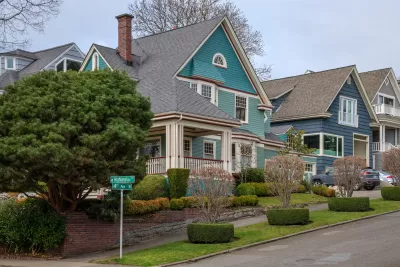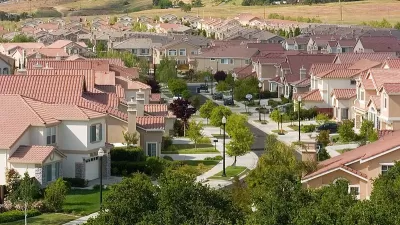Form-based zoning codes can encourage mixed-use development and walkable neighborhoods, but focusing too much on aesthetic elements can drive up the cost of housing.

Writing in The Urbanist, Ryan DiRaimo explains form-based codes, which Seattle is exploring as part of the city’s effort to reform its zoning code.
According to DiRaimo, “The great thing about a form-based code is that it allows things like coffee shops, bookstores, corner stores, and small retail to mix in with the neighborhoods previously zoned exclusively for residential. With a form-based code’s flexibility for land-use, we can finally have vibrant, walkable neighborhoods again.”
However, DiRaimo warns, “where a form-based code fails is when it is used to mandate aesthetic details that have little impact on improving the quality of the public realm—the very purpose of form-based code’s existence.” Pointing to a recently passed state bill, DiRaimo writes that regulating design and aesthetics too much can be “overly prescriptive” and discourage creativity in design.
“With the clock running out on Seattle’s planning process, there is a deep concern that form-based code adoption will include prescriptive design regulations because it’s an established element of the code according to a consultant who has already completed a template.” For DiRaimo, “The eclectic mix of different styles of buildings is what makes Seattle neighborhoods interesting and desirable,” and reviewing every small aesthetic detail won’t improve affordability.
“We need fewer rules and better processes,” DiRaimo concludes. “And since housing is almost never a charity, the aesthetic rules will only kill building plans, limit housing supply, and segregate who can afford to move into the neighborhood.”
FULL STORY: Op-Ed: Off-Base Form-Based Codes Could Be Headed to Seattle

Planetizen Federal Action Tracker
A weekly monitor of how Trump’s orders and actions are impacting planners and planning in America.

Maui's Vacation Rental Debate Turns Ugly
Verbal attacks, misinformation campaigns and fistfights plague a high-stakes debate to convert thousands of vacation rentals into long-term housing.

San Francisco Suspends Traffic Calming Amidst Record Deaths
Citing “a challenging fiscal landscape,” the city will cease the program on the heels of 42 traffic deaths, including 24 pedestrians.

Amtrak Rolls Out New Orleans to Alabama “Mardi Gras” Train
The new service will operate morning and evening departures between Mobile and New Orleans.

The Subversive Car-Free Guide to Trump's Great American Road Trip
Car-free ways to access Chicagoland’s best tourist attractions.

San Antonio and Austin are Fusing Into one Massive Megaregion
The region spanning the two central Texas cities is growing fast, posing challenges for local infrastructure and water supplies.
Urban Design for Planners 1: Software Tools
This six-course series explores essential urban design concepts using open source software and equips planners with the tools they need to participate fully in the urban design process.
Planning for Universal Design
Learn the tools for implementing Universal Design in planning regulations.
Heyer Gruel & Associates PA
JM Goldson LLC
Custer County Colorado
City of Camden Redevelopment Agency
City of Astoria
Transportation Research & Education Center (TREC) at Portland State University
Jefferson Parish Government
Camden Redevelopment Agency
City of Claremont





























